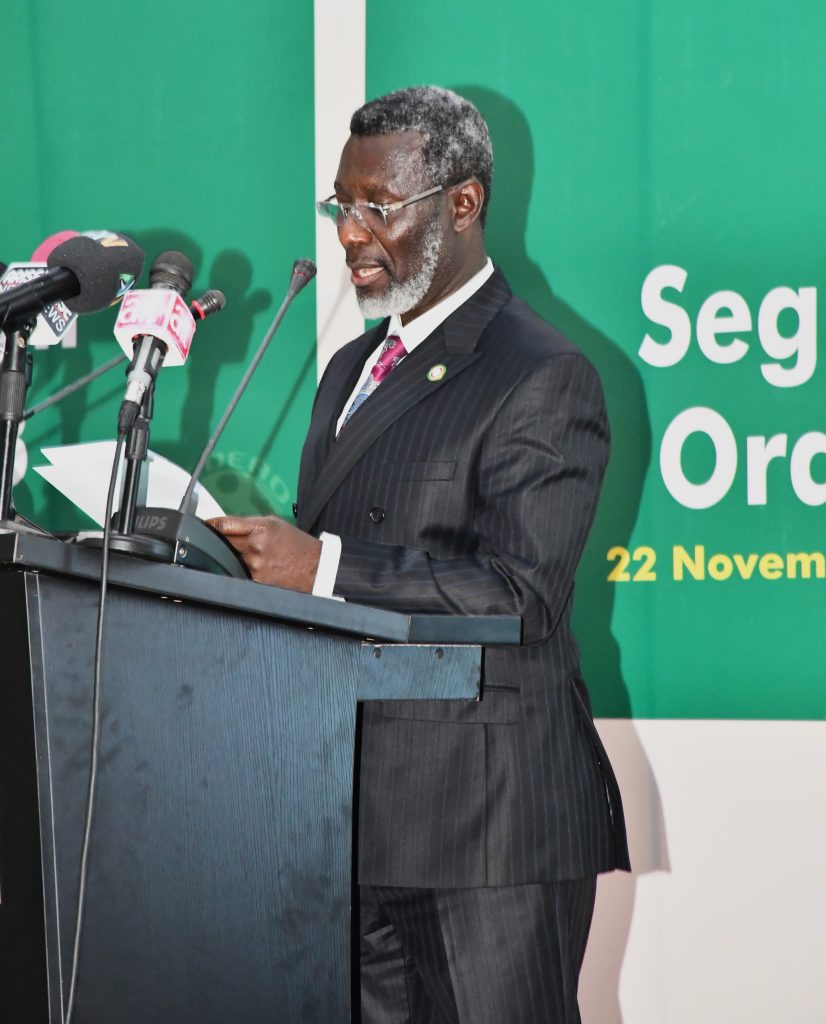Accra, Nov. 22, GNA – The President of the ECOWAS Court of Justice, Justice Edward Amoako, has called for an urgent reflection of the region’s nascent democracy so as to take measures for arresting the glaring lapses exemplified by bad governance, failure to deliver on the dividends of democracy, unfair elections and the quest for unconstitutional tenure elongation.
In a message to the opening of the second ordinary session of the fifth legislature of the ECOWAS Parliament, Justice Asante blamed these gaps for the “creeping incursion of the military into the region’s politics,” which not only a ‘misnomer’ but a demonstration of the “deficiency of our politics.”
These manifestations, he added, should “challenge us to reflect on the trajectory of our democracy and ascertain whether it is imbued with the efficacy and capacity to deliver good governance that satisfies the socio-economic needs of our people.
“It is undeniable that except appropriate action is taken to arrest the creeping military incursion into our politics, democracy is under threat with implications for institutions such as the parliaments and the courts which call for collective action,“ he emphasized.
The President noted that it was in recognition of the threat posed by these incursions to the region’s fledgling democracy that necessitated the Court’s decision to focus the theme of its 2023 conference held in May in The Gambia on ECOWAS zero tolerance for unconstitutional change of government.
He added: “The ECOWAS parliament provides an appropriate forum at the regional level to continue this conversation by revisiting the debate on the particulars of our democracy that was optimistically touted as the panacea for delivering socio-economic growth and development of our people in order to equip them for a competitive international economic environment.”
Despite the current challenges with the region’s democratic progression, Justice Asante acknowledged that it ‘remains the best form of government that requires the collective effort of the leadership and followership to work.

Those invested with the responsibility under democracy, he noted, ‘must realize that it is an opportunity to serve and not indulge in hegemonic and authoritarian rule by a few for themselves’ as this results in state capture by a privileged few.
He, therefore, urged the ECOWAS parliament to provide the leadership to undertake the necessary engagement through the national parliaments ‘to interrogate our current democratic culture.”
This, he added, “will require reforms that will precipitate improvements in our democratic systems in order to end this creeping encroachment of the military into our democratic space,’ assuring that the Court will play its complementary role in consolidating the region’s democracy as the Community institution whose mandate helps to strengthen respect for human rights, accountability and political stability.
In this way, he said that the Court will be contributing to entrenching a culture of respect for the rule of law, accountability and political stability through fidelity to its mandate.
He, therefore, encouraged the Parliament to take the necessary steps, working with national parliaments, to ensure the seamless enforcement of the decisions of the Court by Member State to strengthen community law and respect for human rights, transparency and accountability.
He also challenged the Parliament to take the leadership in ensuring that Member States internalize a culture of democracy, rule of law and good governance, adopt preventive measures for strict compliance and help the states to commit to the establishment of ideals and reinforcement of agreed international protocols that promote respect for the rule of law.
In addition, they should also strengthen the means for settling electoral disputes and the adjudication of electoral disputes.
Finally, Justice Asante suggested that the Parliament should support the States to take ownership of the region’s convergence principles as contained in the Supplementary Protocol on Democracy and Good Governance.
The current session of the Parliament will deliberate on the 2024 consolidated budget of the Community and consider the status of ECOWAS integration and development programmes.
It was preceded by the preparatory meetings of the Bureau of Parliament and conference of committees’ bureau.
GNA